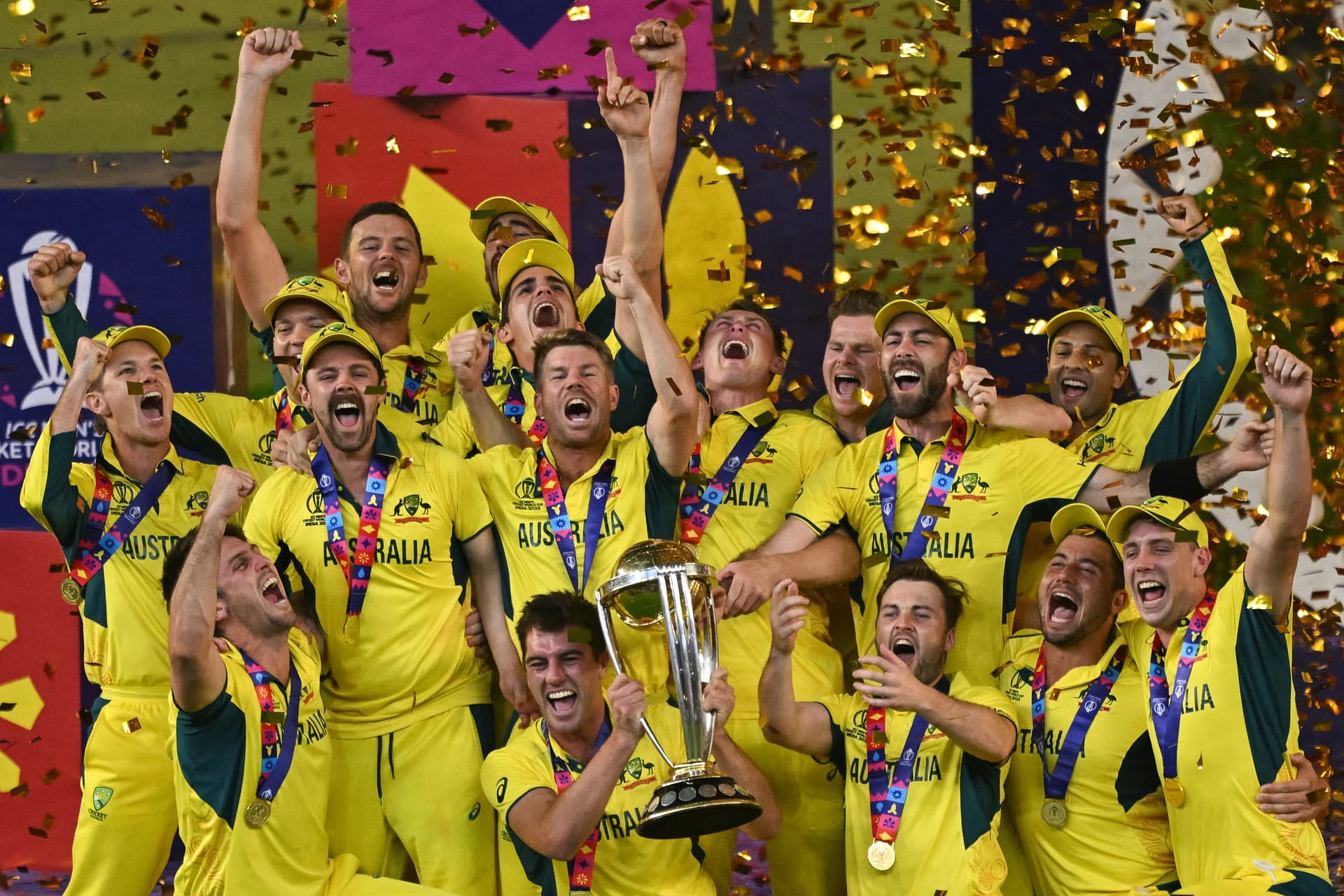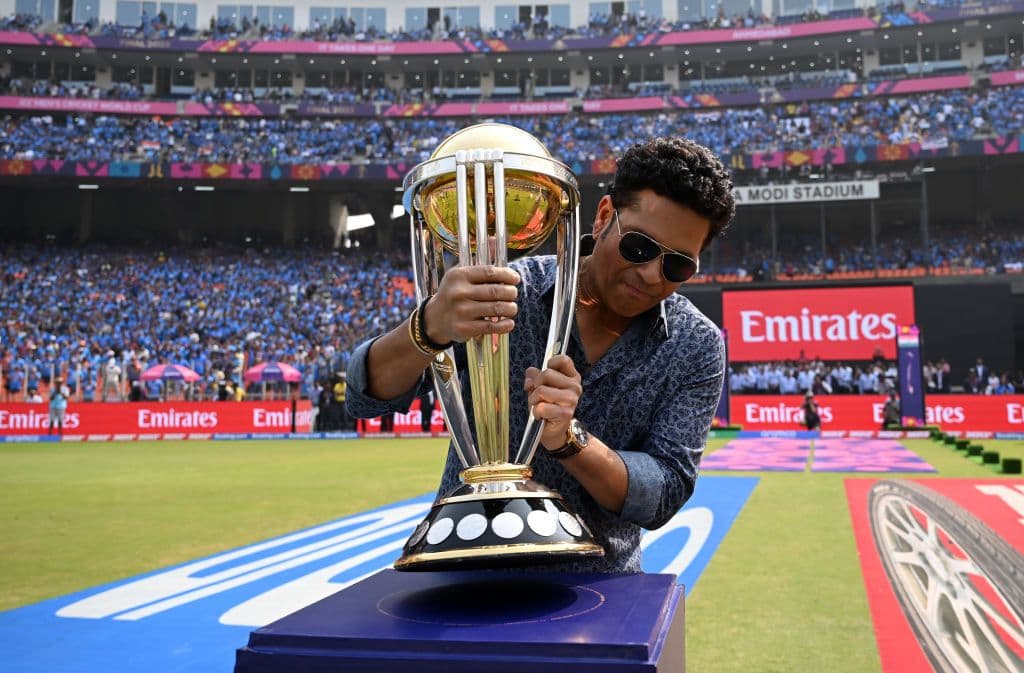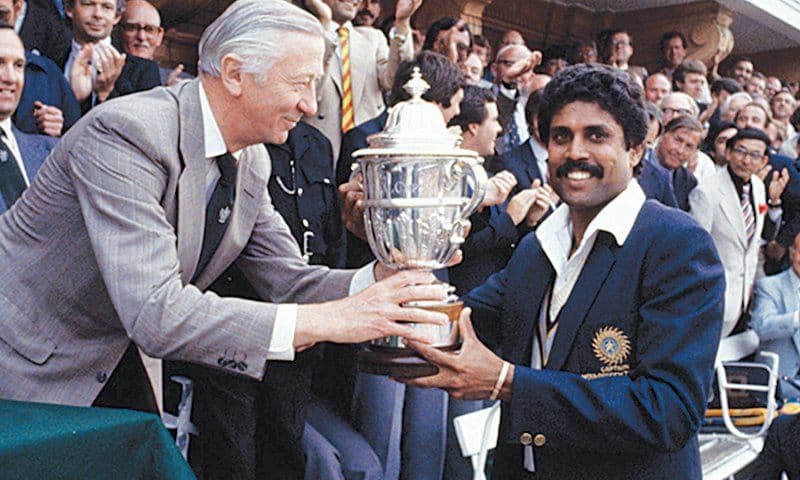Cricket
Which Country has Won the Most 50-Over World Cups?
The ICC Cricket World Cup is considered the pinnacle of the 50-over format and despite the importance and significance of the ongoing bilateral Series played among teams and the prestige of the ICC Champions Trophy, this is the one they all want to win.

Australia's players celebrating with the ICC ODI Men's Cricket World Cup trophy//Getty Images
After all, this is the event that crowns the World Champions of the ODI game.
Dating back to 1975, there have been 13 editions of this tournament, which for the most part has been held every four years. This is an extremely competitive event, pitting the world’s best against each other under the utmost pressure.
Still, one country is head and shoulders above the rest of the world’s elite, having won it on no fewer than six occasions. Let’s look at the history of the competition and how Australia have gone about dominating it, also looking at which other teams have tasted World Cup glory along the way.
Overview of the ICC 50-Over World Cup
The first-ever Cricket World Cup was held in England back in 1975, just four years after the ODI format was introduced. That happened when England played Australia at the MCG in a hastily arranged fixture to make up for the fact that the first three days of a Test match between them was washed out.
That match was played across 40 overs but each over was made up of eight deliveries, which comes to 320 balls per innings, rather than 300 they play these days.
Interestingly, there had been a Women’s World Cup played two years before the men’s one was first held. All of the first three editions of the men’s version of it were played in England, seen as a country with excellent grounds, top-class infrastructures and plenty of passionate fans eager to watch the games live.
Since then, it’s been played every four years, with the exception of the 1992 edition that was staged five years after the previous one, rather than four.
True global appeal
It’s an event with huge global appeal considering that the strongest sides come from Europe (England), Australasia (Australia, New Zealand), Africa (South Africa, Zimbabwe), the Caribbean (West Indies) and Asia (India, Pakistan, Bangladesh, Sri Lanka and Afghanistan), meaning that many of the continents are well-represented here.
Furthermore, its TV coverage all around the world and huge populations eagerly watching in the likes of India, Pakistan and Bangladesh ensure it’s one of the most-viewed sporting events in the world.
Here are some of the key milestones of the competition:
1975 – The West Indies win the first-ever edition in England, beating Australia in the final.
1979 – The West Indies defend their title, also staged in England.
1983 – India stun the Windies in the final, again played in England, to become only the second country to win it.
1987 – Three firsts as India/Pakistan become only the second country to host it and Australia the third country to win it, beating England in the final. It’s also the first edition played across 50 overs per innings, rather than 60.
1992 – Hosted by Australia and New Zealand, it’s won by Pakistan for the first time, who beat England in the final, their second runner-up spot in a row. It’s also the first World Cup played with coloured clothing rather than whites and the first to be played with white, rather than red balls. Additionally, it’s the first time it’s contested by nine teams, rather than eight.
1996 – The first time a World Cup is hosted by there separate countries (Pakistan, Sri Lanka, India) with 12 teams playing, rather than the nine in the previous edition. It’s also Sri Lanka’s first and only win to date, defeating Australia in the final.
2003 – The number of teams increased from 12 to 14. Australia win their second title in a row.
2007 – Australia win their third World Cup in a row, beating Sri Lanka in the final. 16 teams play in it for the first time.
2011 – The first-ever World Cup to use the Decision Review System in an attempt to make the game fairer. India beat Sri Lanka in an exciting final as Sachin Tendulkar finally wins the trophy he’s craved his whole career.
2015 – Co-hosts Australia and New Zealand contest the final, with Australia winning for the fifth time.
2019 – In a thrilling final, England beat New Zealand in a Super Over thanks to boundaries countback, the first time a Super Over was needed in a final. It’s also England’s first and only win to date. The number of teams was reduced from 14 to 10 in this edition.
2023 – Australia stun hosts India as big outsiders in the final to make it six wins for them in the competition.
Most 50-Over World Cup Wins by Country
Table of World Cup Achievements
| National team | Winners | Years won | Runners-up | Years runners-up |
| Australia | 6 | 1987, 1999, 2003, 2007, 2015, 2023 | 2 | 1975, 1996 |
| West Indies | 2 | 1975, 1979 | 1 | 1983 |
| India | 2 | 1983, 2011 | 2 | 2003, 2023 |
| Sri Lanka | 1 | 1996 | 2 | 2007, 2011 |
| Pakistan | 1 | 1992 | 1 | 1999 |
| England | 1 | 2019 | 3 | 1979, 1987, 1992 |
| New Zealand | 0 | - | 2 | 2015, 2019 |
Detailed Analysis of the Top Performers
Australia: The World Cup Giants
Australia had to wait till 1987, the fourth edition of the tournament, before they finally tasted glory.
Played at the iconic Eden Gardens in Kolkata, England were going well in chasing Australia’s 253-5 when Mike Gatting famously played an ill-advised reverse sweep off the bowling of Aussie skipper Allan Border, they lost momentum and ultimately fell 7 runs short to hand Australia their first win.
Australia then made and lost the 1996 final against Sri Lanka, big underdogs going into the match, but weren’t to be denied the next time round when it was staged in England. But not without incident.
Having lost their first two matches, they couldn’t afford any more slip-ups for the rest of the tournament and duly won all of their remaining matches, including the famous semi-final against South Africa where the Proteas needed just one off the final three balls and ended up seeing Allan Donald run out. Earlier, Shane Warne had turned the game on its head with figures of 4-29.
The final was more straightforward as they beat Pakistan easily, allowing skipper Steve Waugh to lift the trophy.
Ricky Ponting succeeded Waugh as captain and went on to lead his team to victories in 2003 (in South Africa) and 2007 (in the West Indies) beating India and Sri Lanka in the final respectively, meaning Ponting won three consecutive World Cups, the last two as captain. The other two players to win three in a row were Glenn McGrath and Adam Gilchrist.
In 2011 a century from Ponting against India in the quarterfinal wasn't enough and they crashed out to the co-hosts. But they weren’t to be denied in 2015 on home soil, now with Michael Clarke in charge, beating New Zealand in the final comfortably.
In 2019, they lost to eventual winners England in the semis, but they were back in business in 2023, going into the final as big underdogs against India. Having restricted Virat Kohli and co to 240, they chased it with ease thanks to a brilliant 137 from Travis Head, well supported by Marnus Labuschagne, to make it six World Cup titles.
West Indies: Pioneers of World Cup Glory
The first-ever edition of the Cricket World Cup in 1975 coincided with the West Indies’ dominance in cricket where the great Clive Lloyd was in charge of a side that also included the likes of Gordon Greenidge, Viv Richards and Andy Roberts, later joined by such legends as Michael Holding, Colin Croft and Joel Garner.
Their aggressive strokeplay- Lloyd scored a century in the 1975 final, Richards in the 1979 final – and fast bowling was too much for Australia in the first final and England in the second, and they threatened to dominate the competition from thereon.
But that’s as good as it got for the Windies in ODI cricket. They went into a third final at Lord’s in 1983, this time against India and were in a good position to make it three in a row when chasing just 184. But some excellent Indian bowling and some poor shot selection saw India dismiss the Windies for just 140, in one of the game’s all-time upsets.
And that was the last final they made in the competition, not even making the semis when at home in 2003.
Though greats such as Brian Lara, Chris Gayle, Dwayne Bravo and Ramnaresh Sarwan were capable of individual brilliance in the late 90s and noughties, they never really gelled as a team and were guilty of inconsistency.
The introduction of T20 cricket in the mid-noughties saw the Windies focus on that format instead and they went on to win T20 World titles but never managed to find a winning formula again in the 50-over game.
India: A Blend of Legacy and Modern Success
India’s success in 1983 was a real shock to everyone, including India themselves.
ODI cricket wasn’t particularly popular in India, and they hadn’t had good results going into the tournament. The legendary opener Sunil Gavaskar never really got to grips with ODI cricket and bar skipper Kapil Dev, there weren’t many stars in the side.
But Mohinder Amarnath hit a valuable 26 and followed that up with bowling figures of 3/12 to turn the game around in the final against the Windies, and they were World Champions out of nowhere.
But they certainly had to wait a while before they came close again. In 2003 a strong side that included Sachin Tendulkar, Sourav Ganguly, Virender Sehwag, Rahul Dravid, Yuvraj Singh and Harbhajan Singh made the final against Australia but got nowhere near Australia’s total of 359, despite a well-made 82 from Sehwag.
But they weren’t to be denied as co-hosts in 2011. Tendulkar, Sehwag, Harbhajan and Yuvraj Singh were still around for that one, as were the likes of Zaheer Khan and a young Virat Kohli in a side beautifully marshalled by keeper-batsman MS Dhoni.
Having negotiated a tricky semi-final against deadly rivals Pakistan, they were in a spot of bother chasing a competitive total from Sri Lanka, with Tendulkar and Sehwag out cheaply. But Gautam Gambhir and MS Dhoni both hit priceless 90s to get home with a couple of overs to spare, Dhoni fittingly hitting the winning runs with a big six.
Tendulkar finally won the trophy he’d been craving for almost two decades, while MS Dhoni secured his second World Cup as skipper, having won the T20 World Cup a couple of years earlier.
India really should have made it three World Cup wins when they hosted the tournament in 2023 but fluffed their lines in the final against Australia, so the wait for another World Cup victory goes on.
Sri Lanka: The plucky underdogs who keep on overachieving
Sri Lanka co-hosted the 1996 edition alongside India and Pakistan and went into the tournament as big outsiders. But they made their mark early on, beating Kenya, Zimbabwe and India and benefiting from walkover wins against Australia and the West Indies after those sides forfeited the match due to safety concerns, topping their group in the process.
They then made light work of chasing England’s 236 in the quarters and were far too good for India in the semis, defending 252 with ease.
Next up was Australia in the final and not many gave them a chance against the likes of Shane Warne, Mark and Steve Waugh, Michael Bevan and a young Ricky Ponting.
But they recovered from the early loss of their openers to chase 242 thanks largely to a magnificent century from Aravinda de Silva and a well-timed 47 from skipper Arjuna Ranatunga to secure one of the sport’s great upsets.
The next two editions were challenging for them, but they were extremely competitive again in 2007 with a brilliant team containing Kumar Sangakarra, Sanath Jayasuriya, Mahela Jayawardene, Lasith Malinga and of course, Muttiah Muralitharan. They then lost a rain-affected final against Australia after allowing Adam Gilchrist to hit a big century.
They came even closer in 2011. Of those mentioned above, only Jayasuriya wasn’t around anymore so they were used to playing together and secured good wins over England and New Zealand in the knockout matches before coming up against India in the final.
They were in a strong position after a magnificent Jayawardene century got them to a competitive total but Dhoni and Gambhir got India over the line, meaning Sri Lanka remain on just one World Cup win.
Insights from the Data
So far, 13 editions of the World Cup have produced six different winners. Pakistan, Sri Lanka and England have each won it once, India and the West Indies twice and as we know, Australia reign supreme with six wins.
The Windies dominated early on with back-to-back wins but their shock defeat to India in 1983 signalled the end of an era and they haven’t come close since.
Between 1983 and 1996 there were four different winners and only Sri Lanka took advantage of being co-hosts during that period, the other three- India, Australia and Pakistan – all winning on foreign soil.
As for Australia, once they got a taste for a World Cup win, they certainly kicked on, winning three in a row, four out of five and eventually five of the last seven editions, thanks to their extremely competitive spirit and a never-ending supply of world-class ODI players including Ponting, Gilchrist, Matthew Hayden, Warne, Andrew Symonds, Glenn McGrath, Mike Hussey and many more.
They’ll certainly be one of the teams to beat when the next World Cup comes around in 2027.
The candidates for the greatest upsets in winning the World Cup go to India (1983), Pakistan (1992) and Sri Lanka (1996) but we’ll give the prize to Sri Lanka, who went into the tournament on a shoestring budget, often lacked proper training facilities and didn’t have much in the way of star names, but played beautifully as a team to upset the great Australia in the final.
But the most dramatic win of all was England’s in 2019. Ben Stokes and Jos Buttler put on an excellent partnership to force a Super Over against New Zealand, and it was tied at the end of that as well, with Martin Guptill famously being run out ‘by the barest of margins’ trying to go for a second run off the last ball of the Super Over.
Controversially, England were deemed winners because they scored more boundaries during the 100 overs of regular play when in hindsight, they should have just played another Super Over.
Conclusion
The World Cup remains the biggest prize in ODI cricket by a country mile.
There have been plenty of changes over the years in terms of the number of overs played, the clothing worn by the players, the colour of the balls, the number of teams in it and the format, but none of this seems to affect Australia’s ability to go on and win it.
It’s highly unlikely that going forward, any cricketer will be able to win it three times in a row the way that Ponting, McGrath and Gilchrist did, as part of some of the greatest ODI teams to ever play the game.
But despite this dominance, plenty of other teams have certainly played their part in the history of the game and the evolution of the World Cup.
There was Sri Lanka’s introduction of big boundary-hitting batting in the Powerplay Overs in 1996 and four years earlier, the swing and reverse swing of Wasim Akram and the decision to bat inspirational skipper Imran Khan at three, rather than his usual position at six or seven. England’s attacking batting in the 20219 World Cup with batters playing with complete freedom and no fear was another positive introduction to World Cup cricket.
But if Australia have dominated in the past, who can we expect to taste victory in the next few editions?
Well, Australia aren’t going away. Though the likes of Pat Cummins, Josh Hazlewood, Glenn Maxwell, Mitchell Starc and Steve Smith are in the twilight of their careers, they may still be around for the next World Cup while bright young stars like Jake Fraser-McGurk, Oliver Davies and Aaron Hardie are more than capable of replacing some of the senior players when they eventually retire.
What Australia will also always have is self-belief and a competitiveness which means they never feel like they’re beaten.
Then there’s India. No side has more strength in depth than them with places in the side at a premium.
Players like the big-hitting duo of Rishabh Pant and Sky Yadav will still be around for a while, as will the calm and collected Shubman Gill, the fearless opener Yashavi Jaiswal and the tyro that is Uman Malik. They’ll be kicking themselves about losing that final in 2023 and will be looking to make amends next time round.
FAQs
Six. They were in: 1983, 1999, 2003, 2007, 2015 and 2023.
India beat the West Indies in a low-scoring final at Lord’s to win their first World Cup in 1983 with Kapil Dev as captain.
Recommended Articles

James has been writing about cricket, football and tennis betting for the best part of 20 years for some of the biggest operators, websites and publications in the industry. Heroes and heroines include Paul Scholes, Chris DiMarco, Anastasia Myskina, Richard Gasquet, Nat-Sciver Brunt and Kumar Sangakarra.


